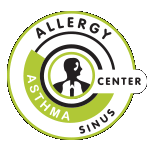FOOD ALLERGIES
While an estimated 40 to 50 million Americans have allergies, only one to two percent of all adults are allergic to foods or food additives. Eight percent of children under age six have adverse reactions to ingested food; but of that percentage, only two to five percent have confirmed food allergies. (Worried about a child who may have food allergies? Visit Your Child's Food Allergies.)
What are the symptoms of a food allergy?
Allergic reactions to foods typically begin within minutes to a few hours after eating the offending food. The frequency and severity of symptoms vary widely from one person to another. Mildly allergic persons may suffer only a runny nose, while highly allergic persons may experience severe and life-threatening reactions.
The most common symptoms of food allergy involve the skin and intestines. Skin reactions include rashes (hives and eczema), while intestinal symptoms typically include vomiting, nausea, stomach cramps, indigestion and/or diarrhea. Other symptoms can be swelling of the tongue, lips or throat; asthma, with coughing or wheezing; rhinitis, often including itchy, stuffy, runny nose and sneezing; loss of blood pressure; and rarely, anaphylaxis, a severe allergic reaction that can be life threatening.
What causes a food allergy?
A food allergy is the result of your body’s immune system over-reacting to food proteins, which then become known as food allergens. Normally your immune system protects the body against allergic reactions; however, in the person with food allergy, the immune system produces increased amounts of the allergic antibody called immunoglobulin E or IgE. When these antibodies combine with food allergens, histamine and other chemicals are released as part of the body’s immune reaction. These chemicals can cause blood vessels to dilate, muscles to contract, and affected skin areas to become red, itchy and swollen. These IgE antibodies can be found in different body tissues – skin, intestines and lungs – where specific allergy symptoms such as hives, vomiting, diarrhea and wheezing occur.
Not all adverse reactions to foods are due to allergy. Some reactions to cows’ milk, for example, are related to a deficiency of an enzyme (lactase) that normally breaks down a sugar in milk (lactose). When individuals with lactase deficiency drink cows’ milk or eat other dairy products, they may experience intestinal symptoms, the most common of which are stomach cramping, gas and diarrhea. This is sometimes misterpreted as a food allergy.
Which foods are most likely to cause an allergic reaction?
Eight basic foods are responsible for 95% of food allergies: egg, wheat, corn, milk, fish, shellfish, soy and nuts; however, almost any food has the potential to trigger an allergy.
Also, if you are allergic to a particular food, you may be allergic to related foods. For example, someone who is allergic to walnuts may also be allergic to pecans, and someone allergic to shrimp may not tolerate crab or lobster.
Note: Oral allergy syndrome or OAS is a type of food allergy that causes reactions in the mouth. The most common one is an itching or burning sensation in the lips and/or mouth, but the same feelings can occur in your ears or throat. Swelling of the lips and tongue and a sensation of tightness in the throat may also happen. Often OAS is coupled with seasonal allergies, a sort of cross-reactivity of already existent allergies. For example, if you are allergic to certain trees (which pollinate the most in spring), you may experience OAS when eating almonds during high tree pollen months.
Overwhelmed by food allergies? We can help!
Worrying about potential food allergies can be stressful. Your symptoms and all of the possible causes can only complicate trying to find the answers. That's why you should trust our board-certified allergists. Their expertise combined with their compassion means they'll listen to your concerns and will work with you to eliminate your worries and the uncertainties. Together, we'll help you know your triggers and develop a plan that'll bring you peace of mind. Take that first step and request an appointment today.
"The ladies that did both my food and environmental allergy tests were beyond excellent and Dr. Joe was great!! I highly recommend them to anyone who needs asthma or allergy care!!!!" -A Bundy
TRUST THE EXPERTS
All physicians board-certified in allergy and immunology

All Rights Reserved | The Allergy, Asthma & Sinus Center
